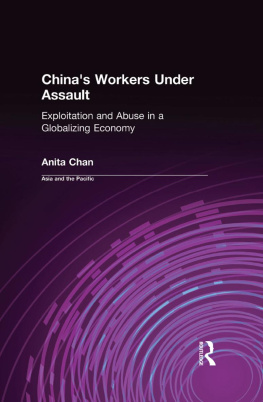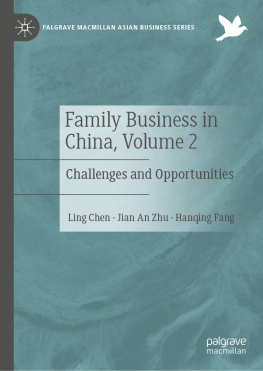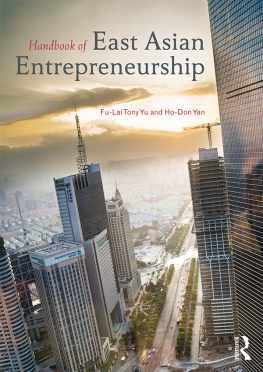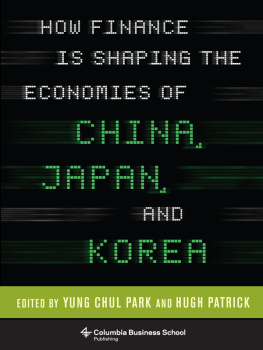International Entrepreneurship
This book explores the importance of entrepreneurs in driving economic growth as the world economy grows and becomes more integrated and more challenging. It examines the situation in both advanced and developing countries and shows how the entrepreneurial orientation of the founders of small and medium sized enterprises has resulted in phenomenal growth, often fuelled by innovation and new technology. It contrasts the experiences of Chinese family business in China and among the overseas Chinese with the experiences of family businesses in the United States and Europe. One important conclusion is that there has been a noticeable fall in entrepreneurial proclivity in the advanced economies, in contrast to the position in emerging economies.
Susan Freeman is Professor of International Business at the University of South Australia Business School, Adelaide, Australia.
Ying Zhu is Associate Director of the Australia Centre for Asian Business at the University of South Australia, Adelaide, Australia.
Malcolm Warner was Professor and Fellow Emeritus of Wolfson College and the Cambridge Judge Business School, University of Cambridge, Cambridge, UK.
Routledge Studies in the Growth Economies of Asia
The Diffusion of Western Economic Ideas in East Asia
Edited by Malcolm Warner
Employers Associations in Asia
Employer Collective Action
Edited by John Benson, Ying Zhu and Howard Gospel
Business Leaders and Leadership in Asia
Ying Zhu, Shuang Ren, Ngan Collins and Malcolm Warner
Innovation, Investment and Intellectual Property in South Korea
Park to Park
Ruth Taplin
A Microcredit Alternative in South Asia
Akhuwats Experiment
Shahrukh Rafi Khan and Natasha Ansari
Development Agenda and Donor Influence in South Asia
Bangladeshs Experiences in the PRSP Regime
Mohammad Mizanur Rahman
How Chinas Silk Road Initiative is Changing the Global Economic Landscape
Edited by Yuan Li and Markus Taube
Trade Unions and Labour Movements in the Asia-Pacific Region
Edited by Byoung-Hoon Lee, Sek-Hong Ng and Russell Lansbury
International Entrepreneurship
A Comparative Analysis
Susan Freeman, Ying Zhu and Malcolm Warner
First published 2020
by Routledge
2 Park Square, Milton Park, Abingdon, Oxon OX14 4RN
and by Routledge
52 Vanderbilt Avenue, New York, NY 10017
Routledge is an imprint of the Taylor & Francis Group, an informa business
2020 Susan Freeman, Ying Zhu and Malcolm Warner
The right of Susan Freeman, Ying Zhu and Malcolm Warner to be identified as authors of this work has been asserted by them in accordance with sections 77 and 78 of the Copyright, Designs and Patents Act 1988.
All rights reserved. No part of this book may be reprinted or reproduced or utilized in any form or by any electronic, mechanical, or other means, now known or hereafter invented, including photocopying and recording, or in any information storage or retrieval system, without permission in writing from the publishers.
Trademark notice: Product or corporate names may be trademarks or registered trademarks, and are used only for identification and explanation without intent to infringe.
British Library Cataloguing-in-Publication Data
A catalogue record for this book is available from the British Library
Library of Congress Cataloging-in-Publication Data
A catalog record has been requested for this book
ISBN: 978-0-815-36337-8 (hbk)
ISBN: 978-1-351-10967-3 (ebk)
Typeset in Times New Roman
by Wearset Ltd, Boldon, Tyne and Wear
Introduction
In this book, we make a quantum leap from the past to the present in considering entrepreneurship. Doing so is rather an act of faith, since we can never be certain there is a linear connection between two points in time. Entrepreneurship is a rather slippery notion, as it has very many dimensions and has been converted across time and space, and between different cultures. Early achievers may have had some characteristics in common with those of today but the connection is very tenuous. Proto-entrepreneurs acted in an early, simple and straightforward way but their counterparts today in the Silicon Valley or in the Chinese Zhongguancun, Haidian, area in Beijing are a very different creation.
The self-dependent entrepreneur usually is a one-man band or operates in a small company. The survival rate is very poor and even today one in three American small businesses fail within a few years. The emergence of early multinationals, such as the East India Company, are said by some to be a model for the modern Multinational Corporation (MNC). In terms of multinationals, size matters, particularly for international trade. The economies of scale also dominate the economies of entrepreneurship. Today, scale is everything as a new technological innovation needs substantial capital investment. The new unicorn billion dollar firms are the order of the day. The Stone Age entrepreneur was a very different person from the promoter and chief executive of say, Google or Baidu. It is rather remarkable that we had to wait until the end of the eighteenth century to have a precise conceptualization and definition of what is an entrepreneur. Even today, pinpointing the definition of an entrepreneur, entrepreneurship and an entrepreneurial organization remains problematic. What we include within a Venn diagram clearly rests on so-called family resemblances and, indeed, fuzzy categories.
In order to resolve some of the above issues, we need to have a general contingency theory that can encapsulate these differences in time, space and culture. The extensive literature on the subject today is rather repetitive and unoriginal. Hence, this book offers new research and thoughts on the direction for the all-important aspects of International Entrepreneurship as well as the important characteristics and nature of the immigrant entrepreneur from these markets. By tackling the key questions related to what, who and why regarding the causes, patterns/models, and processes of internationalisation of entrepreneurship among different entrepreneurial groups with different cultural and ethnical backgrounds, we expect that there will be new findings that show distinct differences among emerging and advanced markets and between entrepreneurs across selected emerging markets given their socio-political backgrounds and historic pathways.
The origins of entrepreneurship
The origins of entrepreneurship are as diverse as they are as ancient. We continue to know very little about entrepreneurs despite the remarkable interest and numerous publications on the topic (Cunningham & Lischeron, 1991). Some suggest that the first entrepreneurs go far back in time and can be traced back to around 20,000 years ago. The first known trading between humans took place in New Guinea and Australasia around 17000 bc , where people would exchange obsidian (a volcanic glass valuable in hunting weapons) for other goods they needed, such as tools, skins and food. This early proto-entrepreneurship continued for millennia. Hunter-gatherer tribes traded goods from different parts of their regions to offer overall benefits for their tribes. Even in the Bible, there are several passages in which the term Canaanite is employed interchangeably with the words for trader and merchant, suggestive of the idea of entrepreneur (Davies, 1994; Briard, 2001; Demoule, 2007).









